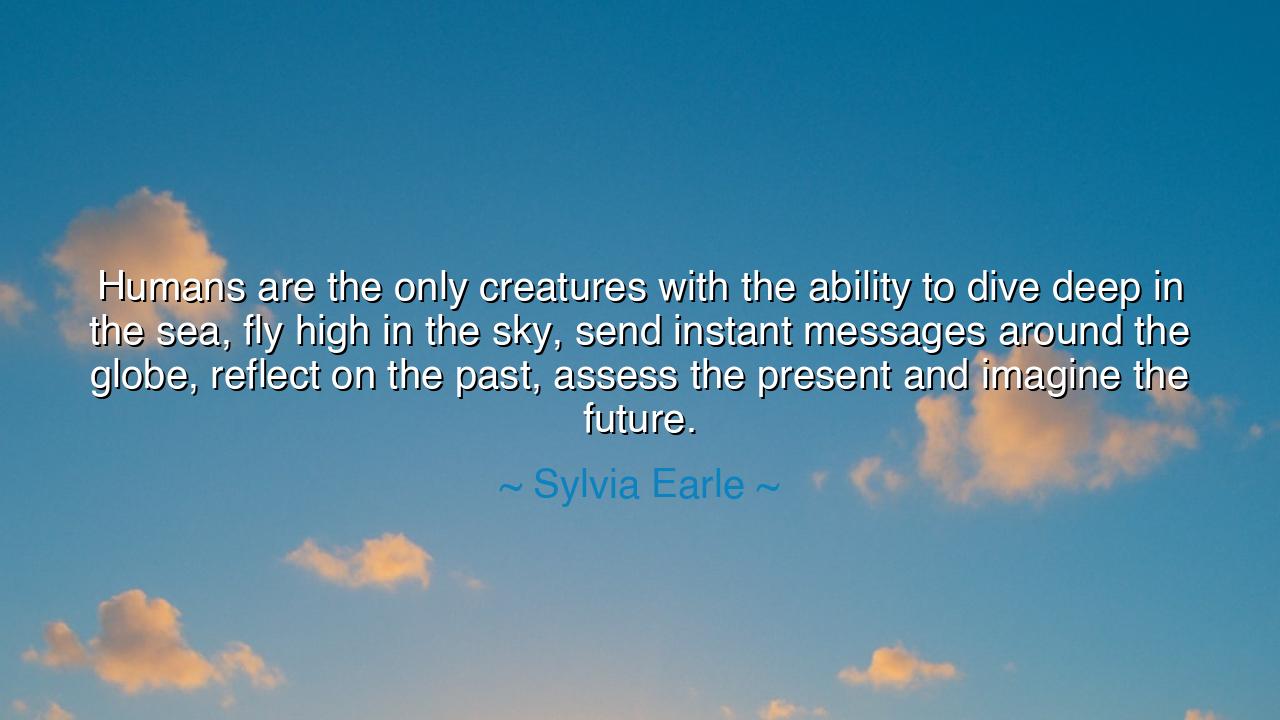
Humans are the only creatures with the ability to dive deep in
Humans are the only creatures with the ability to dive deep in the sea, fly high in the sky, send instant messages around the globe, reflect on the past, assess the present and imagine the future.






"Humans are the only creatures with the ability to dive deep in the sea, fly high in the sky, send instant messages around the globe, reflect on the past, assess the present and imagine the future." These words by Sylvia Earle, a renowned marine biologist and explorer, illuminate a profound truth about the unique gifts that define humanity. We are not merely creatures of the earth, bound by the constraints of nature. We possess a rare ability—to explore the depths of the oceans, the heights of the skies, and the vast reaches of time itself. In this statement, Earle captures the essence of human potential: our capacity to transcend the limitations of our immediate environment and reflect on the larger picture—the journey of life, the history of our kind, and the possibilities of the future.
In the ancient world, thinkers like Aristotle and Socrates marveled at the capacity of humans to engage with the world around them in ways that no other creature could. Aristotle, in his Nicomachean Ethics, explored what it meant to be human, emphasizing that it is our rationality—our ability to think deeply, to reflect on the past, and to plan for the future—that sets us apart. He recognized that the human mind is capable of not only perceiving the world but also reflecting on it, understanding its patterns, and imagining possibilities beyond what the eye can see. Earle’s words, though rooted in the modern scientific age, are a continuation of this ancient celebration of human potential—our capacity to go beyond instinct and use reason, imagination, and innovation to shape our world.
Consider the example of Daedalus, the mythical Greek inventor and craftsman, who fashioned the wings that allowed his son Icarus to fly. Though Icarus’ flight ended in tragedy, Daedalus’ creation represents humanity’s eternal dream of breaking free from the earth. This myth, like many in the ancient world, reflects humanity’s longing to transcend its physical limits. Similarly, Earle’s quote speaks to the extraordinary feats of modern humans: not only are we able to fly with machines, but we have also devised technologies to explore the oceans, to connect across vast distances, and to reflect on the past, present, and future in ways no other species can. Through these achievements, we are fulfilling ancient dreams of exploration and expansion.
In the modern era, one need only look at the space programs of the 20th century to see how far humans have come in the pursuit of these dreams. The moon landing of 1969, led by astronauts like Neil Armstrong, epitomized the human ability to reach beyond the confines of our world, fulfilling the ancient wish of flying to the heavens. In the same vein, the exploration of the oceans, epitomized by explorers like Jacques Cousteau and Sylvia Earle herself, represents the human drive to understand the depths of the Earth, to study what lies beneath the surface, and to unlock the secrets of the marine world. These achievements show that humanity does not simply accept the world as it is but strives to push its boundaries, both physically and intellectually.
Yet, the true miracle of humanity, as Earle emphasizes, is not just our ability to explore but our capacity to reflect. Humans are unique in their ability to engage in self-reflection, to analyze the past, to assess the present, and to envision the future. Ancient civilizations, like the Egyptians and the Romans, built their understanding of the world based on reflection and forward-thinking. The Egyptians constructed pyramids as tombs for their pharaohs, believing in an afterlife. The Romans, with their enduring legal system, built a framework for governing societies that still influences us today. These cultures understood that the ability to reflect on their actions and the outcomes they wished to achieve was the foundation for their enduring legacies.
The lesson from Earle’s quote is clear: we must embrace and harness our unique human abilities—not just to explore the physical world but to understand and shape our role in it. Our ability to reflect on our history, our present circumstances, and our vision for the future is a power that can guide us toward progress and sustainability. The challenge, however, is not just in what we can do, but in how we choose to apply these abilities. Will we use our power to explore and create for the betterment of humanity, or will we squander it? Our potential for greatness is intertwined with our ability to think deeply and act wisely, to ensure that the future we imagine is one of purpose and meaning.
In our own lives, we must take responsibility for how we use our unique abilities. Like the explorers of old and the thinkers who came before us, we must ask ourselves: What do we want to accomplish with the gifts we have been given? How can we use our capacity to imagine, create, and reflect to contribute to the greater good? Let us, as humans, rise to the occasion of our potential, remembering that our greatest achievements are not in our ability to dominate the world but in our ability to understand it, to learn from it, and to shape a future that serves the collective wisdom of humanity.






AAdministratorAdministrator
Welcome, honored guests. Please leave a comment, we will respond soon